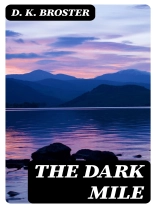In ‘The Dark Mile, ‘ D. K. Broster crafts a haunting narrative set against the backdrop of the Scottish Highlands, blending elements of supernatural horror with a profound psychological exploration of fear and guilt. The novel’s structure reveals a meticulous attention to atmospheric detail and vivid imagery, reflecting a literary style reminiscent of early 20th-century Gothic fiction. Broster deftly weaves folklore and mythology into the fabric of her storytelling, inviting readers to confront the darker aspects of human nature through a lens of supernatural tension. The interplay between the natural landscape and its eerie manifestations creates an unsettling ambiance, underscoring the themes of isolation and the struggle between rationality and the irrational. D. K. Broster, an influential Scottish author and a pivotal figure in the early feminist literary movement, draws upon her own experiences growing up in a family steeped in Scottish culture and history. Her fascination with folklore and the occult translates into a narrative that captures the complexities of human emotion and the weight of legacy. Having lived through the societal shifts of her time, Broster’s perspectives on identity and place inform the chilling essence of ‘The Dark Mile.’ For readers drawn to the intersection of psychological depth and supernatural intrigue, ‘The Dark Mile’ is an indispensable addition to the canon of Gothic literature. Broster’s skillful storytelling and rich thematic exploration compel readers to reflect on their own fears and the shadows that linger within the human psyche. This novel promises a captivating journey into darkness, making it a must-read for those who seek both suspense and substance.
Giới thiệu về tác giả
Dorothy Kathleen Broster, commonly known as D. K. Broster (1877–1950), was a British novelist and short-story writer, notably remembered for her historical romances set around the Jacobite risings. Born in Liverpool, Broster served as a Red Cross nurse in France during World War I, experiences which influenced her subsequent writing. Post-war, she embarked on a writing career that produced more than a dozen novels and numerous short stories. She is best recognized for her trilogy of Jacobite-themed works, ‘The Flight of the Heron’ (1925), ‘The Gleam in the North’ (1927), and ‘The Dark Mile’ (1929), which together relate a stirring tale of adventure amid the backdrop of 18th century Scotland. ‘The Dark Mile’, in particular, reveals Broster’s flair for suspense and character development as it follows the hero, Ewen Cameron, through a landscape rich with historical detail and intrigue. Broster’s literary style is characterized by meticulous research, evocative description, and a capacity to bring the past vividly to life, qualities that have endeared her to lovers of historical fiction. Though her name may not feature prominently in modern literary discourse, her contributions to the genre continue to be respected by academics and readers with an affinity for the romance and tumult of bygone eras.












